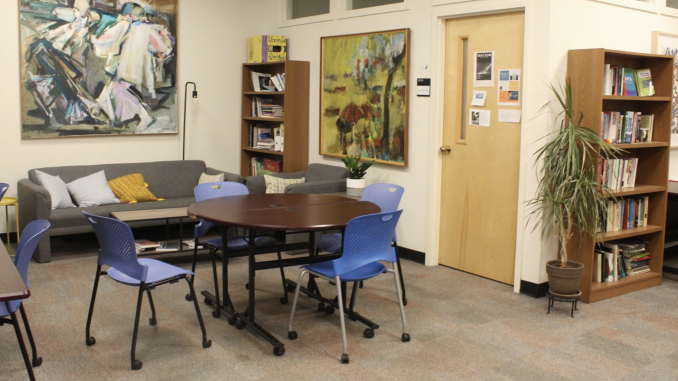
Kate Horan kahoran@ursinus.edu
Communication is a fundamental skill that is utilized in almost every aspect of life. Learning to communicate effectively allows people to exchange thoughts and ideas clearly, conveniently, and successfully. This is essential both in education and in the workplace, making it an important skill for college students to develop. Located in Olin 302, there is a key resource right on campus to teach and improve these skills: the Ursinus Center for Writing and Speaking.
“The most important aspect of teaching and tutoring writing is meeting each individual student where they are. Each piece of writing is unique to the context and to the individual, who brings not only a set of personal and academic goals to the piece, but also their entire history as a writer and as a person,” asserts Dr. Talia Argondezzi, a professor and the director of Ursinus’s Center for Writing and Speaking. Having worked in writing centers for almost twenty years, this is Argondezzi’s tenth year at Ursinus. She describes how the Center has the ability to customize each appointment to the individual. This allows the Center to prioritize listening to students’ voices and focusing on each student’s unique needs. Classroom teachers are not always able to do the same, which makes the Center for Writing and Speaking such a key resource for students. Argondezzi explains that “in each session, we listen as much
as we speak, hear where students want to go, and assess how to best help them get there.”
The Center for Writing and Speaking is a great resource for all students. Although some students believe that it is necessary to have a complete draft to come to the Center, there are actually no requirements. From brainstorming sessions to final edits, Writing Fellows are there to help students with any part of the writing process. This applies to all students, regardless of skill. Even strong and confident writers are encouraged to visit the Center. According to Argondezzi, “Writing Fellows themselves make appointments with us all the time, even though they’re all good writers, because the process of sharing your draft with someone else and hearing an outside opinion can sometimes jar loose some new ideas.” Sessions at the Center are extremely effective in helping students to write better papers, while also helping students to become better writers. Writing Fellows can attest to these improvements, directly viewing the impacts of their work. “I see my work benefiting students when watching repeat students increase their confidence and capabilities. The more they visit the center, the more I see how much their writing skills have improved over time. It’s extremely rewarding,” said Writing Fellow Haleigh Olsen ’23. Additionally, students can come into the Center for speaking and presentation assignments. The Center provides an opportunity for students to rehearse speeches or to go over PowerPoint slides.
The Center for Writing and Speaking is a space where students can interact, connect, and collaborate. This promotes peer learning, allowing both the student and the Writing Fellow to expand their perspectives and consider new ideas. “I most enjoy having the privilege to read really engaging essays from other students. I am in a unique position where I get to learn what other students are doing in their classes by reading their essays, and through engaging with the paper, I learn something as well,” said Writing Fellow Natalie Rubinkam ’24. Sessions at the Center are mutually beneficial and educational for both the student and the Writing Fellow. These interactions also create relationships that support the development of a close-knit campus community. “The thing I enjoy the most about being a Writing Fellow is making connections with the students I work with. It’s really cool to talk to people in class or around campus and have them say, ‘Hey you were my Writing Fellow for my CIE class!’” said Writing Fellow Stephen Wilkins ’23. The Center provides a space for the development of connections and is a uniting resource on campus.
For students who are interested, the Center for Writing and Speaking will be recruiting new Writing Fellows soon. As the director of the Center, Argondezzi says that she looks for students who are good writers and who are “dependable and responsible, interesting, open-minded, and good at communicating.” The position is available through professor nomination only, but Argondezzi can “whisper the entire campus a secret: if you think you’d make a good Writing Fellow, just ask your professor to nominate you.” To nominate you, the professor simply has to email Argondezzi your name. It is important to keep in mind that to become a Writing Fellow you are required to complete a course in the Fall semester. This makes the position best for first and second year students.
The Center for Writing and Speaking is an effective and beneficial resource on campus that students should take advantage of by making appointments here: https://ursinus.mywconline.net.
The Center is a place to improve writing and speaking skills while also promoting interaction and connection. Between Argondezzi and the Writing Fellows, the Center is full of dedicated, supportive, and accepting people who care about students and want to help them succeed. Argondezzi says, “On a pragmatic level, I want Ursinus students to graduate as strong and confident writers and speakers. But underneath that surface, I believe writing is a means to help you understand yourself and your world, so it’s exciting to have the privilege of supporting that process.”
